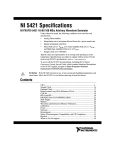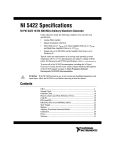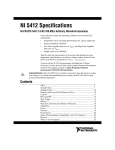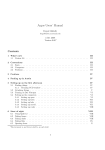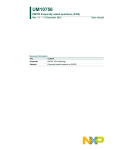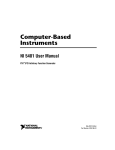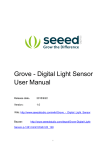Download National Instruments 5441 User's Manual
Transcript
NI 5441 Specifications NI PXI-5441 16-Bit 100 MS/s Arbitrary Waveform Generator with Onboard Signal Processing (OSP) Unless otherwise noted, the following conditions were used for each specification: • Analog Filter enabled. • DAC Interpolation set to maximum allowed factor for a given sample rate. • Signals terminated with 50 Ω. • Direct Path set to 1 Vpk-pk, Low-Gain Amplifier Path set to 2 Vpk-pk, and High-Gain Amplifier Path set to 12 Vpk-pk. • Sample clock set to 100 MS/s. Typical values are representative of an average unit operating at room temperature (25 °C ± 3 °C). Specifications are subject to change without notice. For the most recent NI 5441 specifications, visit ni.com/manuals. To access all the NI 5441 documentation, including the NI Signal Generators Getting Started Guide, which contains functional descriptions of the NI 5441 signals, navigate to Start»Programs»National Instruments»NI-FGEN»Documentation. Hot Surface If the NI 5441 has been in use, it may exceed safe handling temperatures and cause burns. Allow the NI 5441 to cool before removing it from the chassis. Contents CH 0 ........................................................................................................ 2 Sample Clock .......................................................................................... 14 Onboard Clock ........................................................................................ 17 Phase-Locked Loop (PLL) Reference Clock .......................................... 17 CLK IN ................................................................................................... 18 PFI 0 and PFI 1 ....................................................................................... 19 DIGITAL DATA & CONTROL (DDC) ................................................ 20 Start Trigger ............................................................................................ 22 Markers ................................................................................................... 24 Arbitrary Waveform Generation Mode ...................................................25 Function Generation Mode ......................................................................28 Onboard Signal Processing......................................................................29 Calibration ...............................................................................................38 Power .......................................................................................................38 Software...................................................................................................39 Environment ............................................................................................40 Safety, Electromagnetic Compatibility, and CE Compliance .................41 Physical....................................................................................................42 Technical Support Resources ..................................................................43 CH 0 (Channel 0 Analog Output, Front Panel Connector) Specification Value Comments Number of Channels 1 — Connector SMB (jack) — Output Voltage Characteristics Output Paths 1. The software-selectable Main Output Path setting provides full-scale voltages from 12.00 Vpk-pk to 5.64 mVpk-pk into a 50 Ω load. NI-FGEN uses either the Low-Gain Amplifier or the High-Gain Amplifier when the Main Output Path is selected, depending on the Gain attribute. — 2. The software-selectable Direct Path is optimized for IF applications and provides full-scale voltages from 1.000 Vpk-pk to 0.707 Vpk-pk. DAC Resolution NI 5441 Specifications 16 bits — 2 ni.com Specification Value Comments Amplitude and Offset Amplitude Range Amplitude (Vpk-pk) Path Load Minimum Value Maximum Value Direct 50 Ω 0.707 1.00 1 kΩ 1.35 1.91 Open 1.41 2.00 50 Ω 0.00564 2.00 1 kΩ 0.0107 3.81 Open 0.0113 4.00 50 Ω 0.0338 12.0 1 kΩ 0.0644 22.9 Open 0.0676 24.0 LowGain Amplifier HighGain Amplifier Amplitude Resolution 3 digits Offset Range Span of ±25% of Amplitude Range with increments <0.0014% of Amplitude Range. 1. Amplitude values assume the full scale of the DAC is utilized. If an amplitude smaller than the minimum value is desired, then waveforms less than full scale of the DAC can be used. 2. NI-FGEN compensates for userspecified — Not available on the Direct Path. Maximum Output Voltage Maximum Output Voltage Path Load Maximum Output Voltage (Vpk-pk) Direct 50 Ω ±0.500 1 kΩ ±0.953 Open ±1.000 50 Ω ±1.000 1 kΩ ±1.905 Open ±2.000 50 Ω ±6.000 1 kΩ ±11.43 Open ±12.00 LowGain Amplifier HighGain Amplifier © National Instruments Corporation 3 The Maximum Output Voltage of the NI 5441 is determined by the Amplitude Range and the Offset Range. NI 5441 Specifications Specification Value Comments Accuracy DC Accuracy For the Low-Gain or High-Gain Amplifier Path: ±0.2% of Amplitude ± 0.05% of Offset ± 500 µV (within ±10 °C of self-calibration temperature) ±0.4% of Amplitude ± 0.05% of Offset ± 1 mV (0 °C to 55 °C) For the Direct Path: Gain Accuracy: ±0.2% (within ±10 °C of self-calibration temperature) All paths are calibrated for amplitude and gain errors. The Low-Gain and High-Gain Amplifier Paths also are calibrated for offset errors. Gain Accuracy: ±0.4% (0 °C to 55 °C) DC Error: ±30 mV (0 °C to 55 °C) AC Amplitude Accuracy ±1.0% of Amplitude ± 1 mV 50 kHz sine wave. Output Characteristics Output Impedance 50 Ω nominal or 75 Ω nominal, software-selectable. — Load Impedance Compensation Output amplitude is compensated for user-specified load impedances. — Output Coupling DC — Output Enable Software-selectable. When disabled, CH 0 out is terminated with a 1 W resistor with a value equal to the selected output impedance. — Maximum Output Overload The CH 0 output can be connected to a 50 Ω, ±12 V (±8 V for the Direct Path) source without sustaining any damage. No damage occurs if the CH 0 output is shorted to ground indefinitely. — Waveform Summing The CH 0 output supports waveform summing among similar paths—specifically, the outputs of multiple NI 5441 signal generators can be connected together. — NI 5441 Specifications 4 ni.com Specification Value Comments Frequency and Transient Response Bandwidth 43 MHz Measured at –3 dB. DAC Digital Interpolation Filter Software-selectable Finite Impulse Response (FIR) filter. Available interpolation factors are 2, 4, or 8. Refer to the Onboard Signal Processing section for OSP Interpolation. Analog Filter Software-selectable 7-pole elliptical filter for image suppression. Available only on Low-Gain Amplifier and High-Gain Amplifier Paths. Passband Flatness Path Direct Low-Gain Amplifiers +0.6 dB to –0.4 dB +0.5 dB to –1.0 dB 100 Hz to 40 MHz 100 Hz to 20 MHz Pulse Response — High-Gain Amplifiers +0.5 dB to –1.2 dB 100 Hz to 20 MHz Path Direct Low-Gain Amplifier High-Gain Amplifier Rise/Fall Time <5 ns <8 ns <10 ns Aberration <10% <5% <5% © National Instruments Corporation 5 Analog Filter and DAC Interpolation Filter disabled. NI 5441 Specifications 2.0 1.0 +0.3 dB +0.4 dB –0.4 dB –0.4 dB +0.6 dB 0.0 –1.0 –0.4 dB –2.0 dB –3.0 –4.0 –5.0 –6.0 –7.0 –8.0 Guaranteed Specification Typical –9.0 –10.0 1.0M 10.0M 48.0M Frequency (Hz) Figure 1. Normalized Passband Flatness, Direct Path 2.0 1.6 1.2 Amplitude (V) 0.8 0.4 0.0 –0.4 –0.8 –1.2 –1.6 –2.0 0.0 20.0n 40.0n 60.0n 80.0n 100.0n Time (s) Figure 2. Pulse Response, Low-Gain Amplifier Path 50 Ω Load NI 5441 Specifications 6 ni.com 5.0 2.5 0.0 –2.5 –5.0 –7.5 dBm –10.0 –12.5 –15.0 –17.5 –20.0 –22.5 –25.0 –27.5 –30.0 0.0 20.0M 40.0M 60.0M 80.0M 100.0M 120.0M 140.0M 160.0M 180.0M 200.0M Frequency (Hz) Figure 3. Frequency Response of Direct Path, 100 MS/s, 1x DAC Interpolation Note Above 50 MHz, the response is the image response. © National Instruments Corporation 7 NI 5441 Specifications Specification Value Comments Suggested Maximum Frequencies for Common Functions Function Path Direct Low-Gain Amplifier High-Gain Amplifier 43 MHz 43 MHz 43 MHz Square Not recommended* 25 MHz 12.5 MHz Ramp Not recommended* 5 MHz 5 MHz Triangle Not recommended* 5 MHz 5 MHz Sine Disable the Analog Filter and the DAC Interpolation Filter for Square, Ramp, and Triangle. * Direct Path is optimized for the frequency domain. Spectral Characteristics Signal to Noise and Distortion (SINAD) Path Direct Low-Gain Amplifier High-Gain Amplifier 1 MHz 64 dB 66 dB 63 dB 10 MHz 61 dB 60 dB 47 dB 20 MHz 57 dB 56 dB 42 dB 30 MHz 60 dB 62 dB 62 dB 40 MHz 60 dB 62 dB 62 dB 43 MHz 58 dB 60 dB 55 dB NI 5441 Specifications 8 Amplitude –1 dBFS. Measured from DC to 50 MHz. SINAD at low amplitudes is limited by a –148 dBm/Hz noise floor. ni.com Specification Value Comments Spurious-Free Dynamic Range (SFDR) with Harmonics Path Amplitude –1 dBFS. Measured from DC to 50 MHz. Also called harmonic distortion. SFDR with harmonics at low amplitudes is limited by a –148 dBm/Hz noise floor. All values are typical and include aliased harmonics. Direct Low-Gain Amplifier High-Gain Amplifier 1 MHz –76 dBc –71 dBc –58 dBc 10 MHz –68 dBc –64 dBc –47 dBc 20 MHz –60 dBc –57 dBc –42 dBc 30 MHz –73 dBc –73 dBc –74 dBc 40 MHz –76 dBc –73 dBc –74 dBc 43 MHz –78 dBc –75 dBc –59 dBc SFDR without Harmonics Path Direct Low-Gain Amplifier High-Gain Amplifier 1 MHz –88 dBFS –91 dBFS –91 dBFS 10 MHz –87 dBFS –89 dBFS –91 dBFS 20 MHz –80 dBFS –89 dBFS –89 dBFS 30 MHz –73 dBFS –73 dBFS –74 dBFS 40 MHz –76 dBFS –73 dBFS –74 dBFS 43 MHz –78 dBFS –75 dBFS –60 dBFS © National Instruments Corporation 9 Amplitude –1 dBFS. Measured from DC to 50 MHz. SFDR without harmonics at low amplitudes is limited by a –148 dBm/Hz noise floor. All values are typical and include aliased harmonics. NI 5441 Specifications Specification Value Comments 0 ºC to 40 ºC Total Harmonic Distortion (THD) Path Amplitude –1 dBFS. Includes the 2nd through the 6th harmonic. Direct Low-Gain Amplifier High-Gain Amplifier 20 kHz –77 dBc (typical) –77 dBc (typical) –77 dBc (typical) 1 MHz –75 dBc (typical) –70 dBc (typical) –62 dBc (typical) 5 MHz –68 dBc –68 dBc –55 dBc 10 MHz –65 dBc –61 dBc –46 dBc 20 MHz –55 dBc –53 dBc –40 dBc 30 MHz –50 dBc –48 dBc –38 dBc 40 MHz –48 dBc –46 dBc –34 dBc 43 MHz –47 dBc –45 dBc –33 dBc 0 ºC to 55 ºC THD Path Direct Low-Gain Amplifier High-Gain Amplifier 20 kHz –76 dBc (typical) –76 dBc (typical) –76 dBc (typical) 1 MHz –74 dBc (typical) –69 dBc (typical) –61 dBc (typical) 5 MHz –67 dBc –67 dBc –54 dBc 10 MHz –63 dBc –60 dBc –45 dBc 20 MHz –54 dBc –52 dBc –39 dBc 30 MHz –48 dBc –46 dBc –36 dBc 40 MHz –46 dBc –41 dBc –32 dBc 43 MHz –45 dBc –41 dBc –31 dBc NI 5441 Specifications 10 Amplitude –1 dBFS. Includes the 2nd through the 6th harmonic. ni.com Specification Value Comments Spectral Characteristics (Continued) Average Noise Density Amplitude Range Average Noise Density Path Vpk-pk dBm nV ----------Hz Direct 1 4.0 18 –142 –146.0 Low Gain 0.06 –20.4 9 –148 –127.6 Low Gain 0.1 –16.0 9 –148 –132.0 Low Gain 0.4 –4.0 13 –145 –141.0 Low Gain 1 4.0 18 –142 –146.0 Low Gain 2 10.0 35 –136 –146.0 High Gain 4 16.0 71 –130 –146.0 High Gain 12 25.6 213 –120 –145.6 © National Instruments Corporation 11 dBm/Hz dBFS/ Hz Average Noise Density at small amplitudes is limited by a –148 dBm/Hz noise floor. NI 5441 Specifications 10.0 0.0 –10.0 –20.0 dBm –30.0 –40.0 –50.0 –60.0 –70.0 –80.0 –90.0 0.0 25.0M 50.0M 75.0M 100.0M 125.0M 158.0M 175.0M 200.0M Frequency (Hz) Figure 4. 10 MHz Single-Tone Spectrum, Direct Path, 100 MS/s, DAC Interpolation Factor Set to 4 Note The noise floor in Figure 4 is limited by the measurement device. Refer to the Average Noise Density specifications. NI 5441 Specifications 12 ni.com 20.0 10.0 0.0 –10.0 dBm –20.0 –30.0 –40.0 –50.0 –60.0 –70.0 –80.0 –90.0 0.0 25.0M 50.0M 75.0M 100.0M 125.0M 150.0M 175.0M 200.0M Frequency (Hz) Figure 5. 10 MHz Single-Tone Spectrum, Low-Gain Amplifier Path, 100 MS/s, DAC Interpolation Factor Set to 4 The noise floor in Figure 5 is limited by the measurement device. Refer to the Average Noise Density specifications. Note © National Instruments Corporation 13 NI 5441 Specifications 10.0 0.0 –10.0 –20.0 dBm –30.0 –40.0 –50.0 –60.0 –70.0 –80.0 –90.0 0.0 25.0M 50.0M 75.0M 100.0M 125.0M 150.0M 175.0M 200.0M Frequency (Hz) Figure 6. Direct Path, 2-Tone Spectrum (Typical) The noise floor in Figure 6 is limited by the measurement device. Refer to the Average Noise Density specifications. Note Sample Clock Specification Sources Value 1. Internal, Divide-by-N (N ≥ 1) 2. Internal, DDS-based, High-Resolution 3. External, CLK IN (SMB front panel connector) 4. External, DDC CLK IN (DIGITAL DATA & CONTROL front panel connector) Comments Refer to the Onboard Clock section for more information about internal clock sources. 5. External, PXI Star trigger (backplane connector) 6. External, PXI_Trig<0..7> (backplane connector) NI 5441 Specifications 14 ni.com Specification Value Comments Sample Rate Range and Resolution Sample Clock Source Divide-by-N High Resolution CLK IN — Sample Rate Range Sample Rate Resolution 23.84 S/s to 100 MS/s Settable to (100 MS/s) / N (1 ≤ N ≤ 4,194,304) 10 S/s to 100 MS/s 1.06 µHz 200 kS/s to 105 MS/s DDC CLK IN 10 S/s to 105 MS/s PXI Star Trigger 10 S/s to 105 MS/s PXI_Trig<0..7> 10 S/s to 20 MS/s Resolution determined by external clock source. External Sample Clock duty cycle tolerance 40% to 60%. DAC Effective Sample Rate Sample Rate (MS/s) DAC Interpolation Factor Effective Sample Rate 10 S/s to 105 MS/s 1 (Off) 10 S/s to 105 MS/s 12.5 MS/s to 105 MS/s 2 25 MS/s to 210 MS/s 10 MS/s to 100 MS/s 4 40 MS/s to 400 MS/s 10 MS/s to 50 MS/s 8 80 MS/s to 400 MS/s DAC Effective Sample Rate = (DAC Interpolation Factor) × (Sample Rate) Refer to the Onboard Signal Processing section for OSP Interpolation. Sample Clock Delay Range and Resolution Sample Clock Source Delay Adjustment Range Delay Adjustment Resolution Divide-by-N ±1 sample clock period <10 ps HighResolution ±1 sample clock period Sample Clock Period/16,384 0 ns to 7.6 ns <15 ps External (all) © National Instruments Corporation 15 — NI 5441 Specifications Specification Value Comments System Phase Noise and Jitter (10 MHz Carrier) Sample Clock Source System Phase Noise Density (dBc/Hz) Offset 100 Hz 1 kHz 10 kHz System Output Jitter (Integrated from 100 Hz to 100 kHz) Divide-by-N –110 –131 –137 <1.0 ps rms HighResolution1 –114 –126 –126 <4.0 ps rms CLK IN –113 –132 –135 <1.1 ps rms PXI Star Trigger2 –115 –118 –130 <3.0 ps rms External Sample Clock Input Jitter Tolerance Cycle-Cycle Jitter ±300 ps 1. HighResolution specifications increase as the Sample Rate is decreased. 2. PXI Star trigger specification is valid when the Sample Clock Source is locked to PXI_CLK10. — Period Jitter ±1 ns Sample Clock Exporting Exported Sample Clock Destinations 1. PFI<0..1> (SMB front panel connectors) 2. DDC CLK OUT (DIGITAL DATA & CONTROL front panel connector) 3. PXI_Trig<0..7> (backplane connector) Exported Sample Clock Destinations Maximum Frequency Jitter (Typical) Duty Cycle PFI<0..1> 105 MHz PFI 0: 6 ps rms 25% to 65% Exported Sample Clocks can be divided by integer K (1 ≤ K ≤ 4,194,304). — PFI 1: 12 ps rms DDC CLK OUT 105 MHz 40 ps rms 40% to 60% PXI_Trig<0..7> 20 MHz — — NI 5441 Specifications 16 ni.com Onboard Clock (Internal VCXO) Specification Value Comments Clock Source Internal sample clocks can either be locked to a Reference Clock using a phase-locked loop or be derived from the onboard VCXO frequency reference. — Frequency Accuracy ±25 ppm — Phase-Locked Loop (PLL) Reference Clock Specification Sources Value 1. PXI_CLK10 (backplane connector) 2. CLK IN (SMB front panel connector) Comments The PLL Reference Clock provides the reference frequency for the PLL. Frequency Accuracy When using the PLL, the Frequency Accuracy of the NI 5441 is solely dependent on the Frequency Accuracy of the PLL Reference Clock Source. — Lock Time Typical: 70 ms. Maximum: 200 ms. — Frequency Range 5 MHz to 20 MHz in increments of 1 MHz. Default of 10 MHz. — The PLL Reference Clock Frequency has to be accurate to ±50 ppm. Duty Cycle Range 40% to 60% — Exported PLL Reference Clock Destinations 1. PFI<0..1> (SMB front panel connectors) — 2. PXI_Trig<0..7> (backplane connector) © National Instruments Corporation 17 NI 5441 Specifications CLK IN (Sample Clock and Reference Clock Input, Front Panel Connector) Specification Value Comments Connector SMB (jack) — Direction Input — Destinations 1. Sample Clock — 2. PLL Reference Clock Frequency Range 1 MHz to 105 MHz (Sample Clock destination and sine waves) — 200 kHz to 105 MHz (Sample Clock destination and square waves) 5 MHz to 20 MHz (PLL Reference Clock destination) Input Voltage Range Sine wave: 0.65 Vpk-pk to 2.8 Vpk-pk into 50 Ω (0 dBm to +13 dBm) — Square wave: 0.2 Vpk-pk to 2.8 Vpk-pk into 50 Ω Maximum Input Overload ±10 V — Input Impedance 50 Ω — Input Coupling AC — NI 5441 Specifications 18 ni.com PFI 0 and PFI 1 (Programmable Function Interface, Front Panel Connectors) Specification Value Comments Connectors Two SMB (jacks) — Direction Bidirectional — Frequency Range DC to 105 MHz — As an Input (Trigger) Destinations Start Trigger — Maximum Input Overload –2 V to +7 V — VIH 2.0 V — VIL 0.8 V — Input Impedance 1 kΩ — As an Output (Event) Sources 1. Sample Clock divided by integer K (1 ≤ K ≤ 4,194,304) — 2. Sample Clock Timebase (100 MHz) divided by integer M (2 ≤ M ≤ 4,194,304) 3. PLL Reference Clock 4. Marker 5. Exported Start Trigger (Out Start Trigger) Output Impedance 50 Ω — Maximum Output Overload –2 V to +7 V — VOH Minimum: 2.9 V (open load), 1.4 V (50 Ω load) VOL Maximum: 0.2 V (open load), 0.2 V (50 Ω load) Rise/Fall Time ≤2.0 ns © National Instruments Corporation Output drivers are +3.3 V TTL compatible. Measured with a 1 m cable. Load of 10 pF. 19 NI 5441 Specifications DIGITAL DATA & CONTROL (DDC) Optional Front Panel Connector Specification Value Comments Connector Type 68-pin VHDCI female receptacle — Number of Data Output Signals 16 — Control Signals 1. DDC CLK OUT (clock output) — 2. DDC CLK IN (clock input) 3. PFI 2 (input) 4. PFI 3 (input) 5. PFI 4 (output) 6. PFI 5 (output) Ground 23 pins — Output Signal Characteristics (Includes Data Outputs, DDC CLK OUT, and PFI<4..5>) Signal Type Signal Characteristics LVDS (Low-Voltage Differential Signal) Minimum Typical Maximum VOH — 1.3 V 1.7 V VOL 0.8 V 1.0 V — Differential Output Voltage 0.25 V — 0.45 V Output Common-Mode Voltage 1.125 V — 1.375 V Differential Pulse Skew (skew within a differential pair) — — 0.6 ns Rise/Fall Time — 0.5 ns 1.6 ns NI 5441 Specifications 20 — 1. Tested with 100 Ω differential load. 2. Measured at the front panel. 3. Load capacitance <15 pF. 4. Driver and receiver comply with ANSI/TIA/ EIA-644. ni.com Specification Value Comments Output Signal Characteristics (Continued) Output Skew Typical: 1 ns, maximum 2 ns. Skew between any two outputs on the DIGITAL DATA & CONTROL front panel connector. — Output Enable/Disable Controlled through the software on all Data Output Signals and Control Signals collectively. When disabled, the outputs go to a high-impedance state. — Maximum Output Overload –0.3 V to +3.9 V — Input Signal Characteristics (Includes DDC CLK IN and PFI<2..3>) Signal Type LVDS (Low-Voltage Differential Signal) — Input Differential Impedance 100 Ω — Maximum Output Overload –0.3 V to +3.9 V — Signal Characteristics — Minimum Maximum Differential Input Voltage 0.1 V 0.5 V Input Common Mode Voltage 0.2 V 2.2 V DDC CLK OUT Clocking Format Data outputs and markers change on the falling edge of DDC CLK OUT. — Frequency Range Refer to the Sample Clock section for more information. — Duty Cycle 40% to 60% — Jitter 40 ps rms — © National Instruments Corporation 21 NI 5441 Specifications Specification Value Comments DDC CLK IN Clocking Format DDC Data Output signals change on the rising edge of DDC CLK IN. — Frequency Range 10 Hz to 105 MHz — Input Duty Cycle Tolerance 40% to 60% — Input Jitter Tolerances 300 ps pk-pk of Cycle-Cycle Jitter, and 1 ns rms of Period Jitter. — Start Trigger Specification Sources Value 1. PFI<0..1> (SMB front panel connectors) Comments — 2. PFI<2..3> (DIGITAL DATA & CONTROL front panel connector) 3. PXI_Trig<0..7> (backplane connector) 4. PXI Star trigger (backplane connector) 5. Software (use function call) 6. Immediate (does not wait for a trigger). Default. Modes 1. Single — 2. Continuous 3. Stepped 4. Burst Edge Detection Rising — Minimum Pulse Width 25 ns. Refer to the ts1 documentation in the NI Signal Generators Help by navigating to NI Signal Generators Help»Devices»NI 5441»Triggering»Trigger Timing. — NI 5441 Specifications 22 ni.com Specification Delay from Start Trigger to CH 0 Analog Output with OSP Disabled. Value DAC Interpolation Factor Comments Typical Delay Digital Interpolation Filter disabled. 44 Sample Clock Periods + 110 ns 2 58 Sample Clock Periods + 110 ns 4 64 Sample Clock Periods + 110 ns 8 65 Sample Clock Periods + 110 ns Refer to the ts2 documentation in the NI Signal Generators Help by navigating to NI Signal Generators Help»Devices» NI 5441» Triggering» Trigger Timing. Delay from Start Trigger to Digital Data Output with OSP Disabled. 40 Sample Clock periods + 110 ns. — Additional Delay for Function Generator Mode. Add 33 Sample Clock Periods — Additional Delay with OSP Enabled. Add 70 Sample Clock Periods for Real data processing mode (Applicable to Delay from Start Trigger to CH0 Analog Output and Delay from Start Trigger to Digital Data Output.) FIR and CIC filters enabled. Add 73 Sample Clock Periods for Complex data processing mode. (Applicable to Delay from Start Trigger to CH0 Analog Output and Delay from Start Trigger to Digital Data Output.) Trigger Exporting Exported Trigger Destinations A signal used as a trigger can be routed out to any destination listed in the Destinations specification of the Markers section. — Exported Trigger Delay 65 ns (typical). Refer to the ts3 documentation in the NI Signal Generators Help by navigating to NI Signal Generators Help»Devices»NI 5441»Triggering»Trigger Timing. — Exported Trigger Pulse Width >150 ns. Refer to the ts4 documentation in the NI Signal Generators Help by navigating to NI Signal Generators Help»Devices»NI 5441»Triggering»Trigger Timing. — © National Instruments Corporation 23 NI 5441 Specifications Markers Specification Destinations Value Comments 1. PFI<0..1> (SMB front panel connectors) — 2. PFI<4..5> (DIGITAL DATA & CONTROL front panel connector) 3. PXI_Trig<0..6> (backplane connector) Quantity One Marker per Segment. — Quantum Marker position must be placed at an integer multiple of four samples (two samples for Complex (IQ) data). — Width >150 ns. Refer to the tm2 documentation in the NI Signal Generators Help by navigating to NI Signal Generators Help»Devices»NI 5441»Waveform Generation»Marker Events. — Skew Destination NI 5441 Specifications With Respect to Digital Data Output PFI<0..1> ±2 Sample Clock Periods N/A PFI<4..5> N/A <2 ns ±2 Sample Clock Periods N/A PXI_Trig<0..6> Jitter With Respect to Analog Output 20 ps rms Refer to the tm1 documentation in the NI Signal Generators Help by navigating to NI Signal Generators Help»Devices» NI 5441» Waveform Generation» Marker Events. — 24 ni.com Arbitrary Waveform Generation Mode Specification Value Comments Memory Usage The NI 5441 uses the Synchronization and Memory Core (SMC) technology in which waveforms and instructions share onboard memory. Parameters, such as number of segments in sequence list, maximum number of waveforms in memory, and number of samples available for waveform storage, are flexible and user defined. For more information, refer to the NI Signal Generators Help by navigating to NI Signal Generators Help» Programming» NI-TClk Synchronization Help. Onboard Memory Size 32 MB option: 33,554,432 bytes Output Modes Arbitrary Waveform mode and Arbitrary Sequence mode — Arbitrary Waveform Mode In Arbitrary Waveform mode, a single waveform is selected from the set of waveforms stored in onboard memory and generated. — Arbitrary Sequence Mode In Arbitrary Sequence mode, a sequence directs the NI 5441 to generate a set of waveforms in a specific order. Elements of the sequence are referred to as segments. Each segment is associated with a set of instructions. The instructions identify which waveform is selected from the set of waveforms in memory, how many loops (iterations) of the waveform are generated, and at which sample in the waveform a marker output signal is sent. — © National Instruments Corporation 256 MB option: 512 MB option: 268,435,456 bytes 536,870,912 bytes 25 — NI 5441 Specifications Specification Minimum Waveform Size (Samples) Value Comments Trigger Mode Arbitrary Waveform Mode Arbitrary Sequence Mode Single 16 16 Continuous 16 96 @ >50 MS/s 32 @ ≤50 MS/s Stepped 32 96 @ >50 MS/s 32 @ ≤50 MS/s Burst 16 The Minimum Waveform Size is sample rate dependent in Arbitrary Sequence mode. For Complex (IQ) data Minimum Waveform Size is halved. 512 @ >50 MS/s 256 @ ≤50 MS/s Loop Count 1 to 16,777,215. Burst trigger: Unlimited — Quantum Waveform size must be an integer multiple of four samples (two samples for Complex (IQ) data). — Memory Limits 32 MB Option 256 MB Option 512 MB Option Arbitrary Waveform Mode, Maximum Waveform Memory 16,777,088 Samples 134,217,600 Samples 268,435,328 Samples Arbitrary Sequence Mode, Maximum Waveform Memory 16,777,008 Samples NI 5441 Specifications All trigger modes except where noted. For Complex (IQ) data Maximum Waveform Memory is halved. 134,217,520 Samples 268,435,200 Samples Condition: One or two segments in a sequence. For Complex (IQ) data Maximum Waveform Memory is halved. 26 ni.com Specification Value Comments Memory Limits (Continued) Arbitrary Sequence Mode, Maximum Waveforms Arbitrary Sequence Mode, Maximum Segments in a Sequence 262,000 2,097,000 4,194,000 Burst trigger: 32,000 Burst trigger: 262,000 Burst trigger: 524,000 418,000 3,354,000 6,708,000 Burst trigger: 262,000 Burst trigger: 2,090,000 Burst trigger: 4,180,000 Condition: One or two segments in a sequence. Condition: Waveform memory is <4,000 samples. (<2,000 samples for Complex (IQ) Data.) Waveform Play Times 32 MB Maximum Play Time, Sample Rate = 100 MS/s, OSP Disabled 0.16 seconds Maximum Play Time, IQ Rate = 1 MS/s, Real Mode, OSP Enabled 16 seconds Maximum Play Time, IQ Rate = 100 kS/s, Real Mode, OSP Enabled 2 minutes and 47 seconds © National Instruments Corporation 256 MB 512 MB 1.34 seconds 2 minutes and 14 seconds 22 minutes and 22 seconds 27 2.68 seconds 4 minutes and 28 seconds 44 minutes and 43 seconds Single Trigger Mode. Play Times can be significantly extended by using Continuous, Stepped, or Burst Trigger Modes. For Complex (IQ) Mode the Play Times are halved. NI 5441 Specifications Function Generation Mode Specification Value Standard Waveforms and Maximum Frequencies Memory Size Comments Waveform Maximum Frequency Sine 43 MHz Square 25 MHz Triangle 5 MHz Ramp Up 5 MHz Ramp Down 5 MHz DC — Noise (Pseudo-Random) 5 MHz User Defined 43 MHz 65,536 Samples for 1/4 symmetric waveforms (Example: Sine) 16, 384 Samples for non-1/4 symmetric waveforms (Example: Ramp) — 16-bit samples. User Defined Waveforms must be exactly 16,384 samples. Frequency Resolution 355 nHz — Phase Resolution 0.0055º — NI 5441 Specifications 28 ni.com Onboard Signal Processing Onboard Signal Processing Pre-Filter Gain I Waveform Memory Output Engine Pre-Filter Offset I I FIR I CIC X IQ Rate – Pre-Filter Gain Q Pre-Filter Offset Q Q FIR Q CIC Rate Change (OSP Interpolation) DAC Interpolation DAC X Iφ IQ Rate Digital Gain Qφ NCO Sample Rate Rate Change Effective Sample Rate Figure 7. Onboard Signal Processing Block Diagram Specification Value Comments IQ Rate OSP Interpolation Range 12 to 512 (Multiples of 2) 512 to 1,024 (Multiples of 4) 1,024 to 2,048 (Multiples of 8) (OSP Interpolation = FIR Interpolation × CIC Interpolation) IQ Rate Sample Rate/OSP Interpolation (Lower IQ Rates are possible by either lowering the sample rate or doing software interpolation) Data Processing Modes 1. Real (I path only) Total NI PXI-5441 Interpolation = OSP Interpolation × DAC Interpolation. Example: For a Sample Rate of 100 MS/s, IQ Rate Range = 48.8 kS/s to 8.3 MS/s — 2. Complex (IQ) Pre-Filter Gain and Offset Pre-Filter Gain and Offset Resolution 18 Bits Pre-Filter Gain Range –2.0 to +2.0 (Values < |1| attenuate User Data) © National Instruments Corporation — 29 Unitless NI 5441 Specifications Specification Value Comments Pre-Filter Offset Range –1.0 to +1.0 Applied after Pre-Filter Gain Output Output = (User Data × Pre-Filter Gain) + Pre-Filter Offset (–1 ≤ Output ≤ +1) Pre-Filter Output FIR (Finite Impulse Response) Filter Filter Length 95 Taps Coefficient Width 17 bits (–1 to +1) Filter Symmetry Symmetric Interpolation Range 2, 4, or 8 Coefficients Automatically generated by NI-FGEN (refer to FIR Filter Types) or Custom Coefficients provided by the user NI 5441 Specifications The FIR Filter is used to pulse shape the IQ Data and to compensate for the CIC Filter roll-off. 30 ni.com Specification Value Comments FIR Filter Types Filter Type Parameter Minimum Maximum — — — Passband 0.1 0.43 Lowpass Filter that minimizes ripple to: IQ Rate × Passband. BT 0.1 0.9 — Raised Cosine Alpha 0.1 0.9 Root Raised Cosine Alpha 0.1 0.9 Custom Flat Gaussian — Coefficients are provided by the user. CIC (Cascaded Integrator-Comb) Filter Size 6 Stages Interpolation Range 6 ≤ Interpolation ≤ 256 (integers) The CIC Filter does the majority of the interpolation in the OSP. NCO (Numerically Controlled Oscillator) Frequency Range 1 mHz to (0.43 × Sample Rate) Frequency Resolution Sample Rate / 248 I and Q Phase Resolution 0.0055º — Phase Quantization 16 bits Look-Up Table Address Width Tuning Speed 1 ms © National Instruments Corporation — Example: 355 nHz with a Sample Rate of 100 MS/s — 31 NI 5441 Specifications Specification Value Comments Modulation Performance (Typical) Modulation Configuration GSM Physical Layer1 W-CDMA Physical Layer2 DVB Physical Layer3 Measurement Type FIR Interpolation — 2 4 8 MER (Modulation Error Ratio) 46 dB 47 dB 42 dB EVM (Error Vector Magnitude) <0.5 % rms <0.5 % rms <0.8 % rms MER (Modulation Error Ratio) 46 dB 39 dB — EVM (Error Vector Magnitude) <0.5 % rms <1.0 % rms — ACPR (Adjacent Channel Power Ratio) (External Sample Clock) 65 dBc 68 dBc — ACPR (Adjacent Channel Power Ratio) (High-Resolution Sample Clock) 61 dBc 61 dBc — MER (Modulation Error Ratio) 43 dB — — EVM (Error Vector Magnitude) <0.6 % rms — — ACPR (Adjacent Channel Power Ratio) (External Sample Clock) 48 dBc — — ACPR (Adjacent Channel Power Ratio) (High-Resolution Sample Clock) 47 dBc — — Direct Path (4 dBm Peak), 25 MHz Carrier Direct Path (4 dBm Peak), 25 MHz Carrier, ACPR Measurement BW = 4 MHz & Channel Spacing = 5 MHz Direct Path (4 dBm Peak), 25 MHz Carrier, ACPR Measurement BW = 7.96 MHz & Channel Spacing = 8 MHz 1 OSP Enabled. IQ Rate = 1.083 MS/s, 4 Samples/Symbol. FIR Filter Type = Flat, Passband = 0.4. MSK modulation: Software Pulse Shaping and Phase Accumulation, 270.833 kS/s, Gaussian, BT = 0.3. PN Sequence Order = 14. 2 OSP Enabled. IQ Rate = 3.84 MS/s, 1 Sample/Symbol. FIR Filter Type = Root Raised Cosine, Alpha = 0.22. QPSK. PN Sequence Order = 15. 3 OSP Enabled. IQ Rate = 6.92 MS/s, 1 Sample/Symbol. FIR Filter Type = Root Raised Cosine, Alpha = 0.15. 32 QAM Modulation. PN Sequence Order = 15. NI 5441 Specifications 32 ni.com Specification Value Comments Digital Performance Maximum NCO Spur FIR Interpolation < –90 dBc IQ Rate Range (with 100 MS/s Sample Clock Rate) Full-Scale Output — OSP Out of Band Suppression OSP Passband Ripple 2 195 kS/s to 8.33 MS/s 63 dB 0 to –0.08 dB 4 97.6 kS/s to 4.16 MS/s 74 dB 0 to –0.08 dB 8 48.8 kS/s to 2.08 MS/s 40 dB 0 to –0.8 dB © National Instruments Corporation 33 FIR Filter Type = Flat. Passband = 0.4. Ripple Measurement to 0.4 × IQ Rate. Stop Band Suppression from 0.6 × IQ Rate. NI 5441 Specifications Figure 8. GSM Physical Layer1 External Sample Clocking = 99.665 MHz Figure 9. GSM Physical Layer1 Internal (High Resolution) Sample Clocking = 99.665 MHz Additional artifacts are due to High Resolution Clock spurs. 1 OSP Enabled. Direct Path (4 dBm Peak). 25 MHz Carrier. IQ Rate = 1.083 MS/s, 4 Samples/Symbol. FIR Filter Type = Flat, Passband = 0.4. Software MSK modulation: 270.833 kS/s, Gaussian, BT = 0.3. PN Sequence Order = 14. NI 5441 Specifications 34 ni.com Figure 10. CDMA 2000 Physical Layer1 External Sample Clocking = 98.304 MHz Figure 11. CDMA 2000 Physical Layer1 Internal (High Resolution) Sample Clocking = 98.304 MHz Additional artifacts are due to High Resolution Clock spurs. 1 OSP Enabled. Direct Path (4 dBm Peak). 25 MHz Carrier. IQ Rate = 1.2288 MS/s, 1 Sample/Symbol. FIR Filter Type = Custom Flat Filter with Passband = 0.48. QPSK. PN Sequence Order = 15. © National Instruments Corporation 35 NI 5441 Specifications Figure 12. W-CDMA Physical Layer1 External Sample Clocking = 92.16 MHz Figure 13. W-CDMA Physical Layer1 Internal (High Resolution) Sample Clocking = 92.16 MHz Additional artifacts are due to High Resolution Clock spurs. 1 OSP Enabled. Direct Path (4 dBm Peak). 25 MHz Carrier. IQ Rate = 3.84 MS/s, 1 Sample/Symbol. FIR Filter Type = Root Raised Cosine, Alpha = 0.22. QPSK. PN Sequence Order = 15. NI 5441 Specifications 36 ni.com Figure 14. DVB Physical Layer1 External Sample Clocking = 96.88 MHz Artifacts at 15 and 35 MHz are due to 2x FIR Interpolation aliasing. Figure 15. DVB Physical Layer1 Internal (High Resolution) Sample Clocking = 96.88 MHz Artifact at 10 MHz is due to CLK IN feed-through. Additional artifacts are due to High Resolution Clock spurs. 1 OSP Enabled. Direct Path (4 dBm Peak). 25 MHz Carrier. IQ Rate = 6.92 MS/s, 1 Sample/Symbol. FIR Filter Type = Root Raised Cosine, Alpha = 0.15. 32 QAM Modulation. PN Sequence Order = 15. © National Instruments Corporation 37 NI 5441 Specifications Calibration Specification Value Comments Self-Calibration An onboard, 24-bit ADC and precision voltage reference are used to calibrate the DC gain and offset. The self-calibration is initiated by the user through the software and takes approximately 75 seconds to complete. — External Calibration The External Calibration calibrates the VCXO, voltage reference, output impedance, DC gain, and offset. Appropriate constants are stored in nonvolatile memory. — Calibration Interval Specifications valid within 2 years of External Calibration. — Warm-up Time 15 minutes — Power Specification Typical Operation Overload Operation Comments +3.3 VDC 1.9 A 2.7 A +5 VDC 2.2 A 2.4 A +12 VDC 0.46 A 0.5 A –12 VDC 0.01 A 0.01 A Typical. Overload operation occurs when CH 0 is shorted to ground. Total Power 22.9 W 27.0 W NI 5441 Specifications 38 ni.com Software Specification Value Comments Driver Software NI-FGEN 2.3 or later version. NI-FGEN is an IVI-compliant driver that allows you to configure, control, and calibrate the NI 5441. NI-FGEN provides application programming interfaces for many development environments. — Application Software NI-FGEN provides programming interfaces for the following application development environments: — • LabVIEW • LabWindows™/CVI™ • Measurement Studio • Microsoft Visual C++ .NET • Microsoft Visual C/C++ • Microsoft Visual Basic Interactive Control and Configuration Software NI provides several options for interactively controlling and configuring the NI 5441: — • NI Signal Express • FGEN Soft Front panel • NI Measurement & Automation Explorer (MAX) © National Instruments Corporation 39 NI 5441 Specifications Environment NI PXI-5441 Environment Note To ensure that the NI PXI-5441 cools effectively, follow the guidelines in the Maintain Forced-Air Cooling Note to Users included in the NI 5441 kit. The NI PXI-5441 is intended for indoor use only. Specifications Operating Temperature Value 0 ºC to +55 ºC in all NI PXI chassis except the following: Comments — 0 ºC to +45 ºC when installed in an NI PXI-101x or NI PXI-1000B chassis. Meets IEC-60068-2-1 and IEC-60068-2-2. Storage Temperature –25 ºC to +85 ºC. Meets IEC-60068-2-1 and IEC-60068-2-2. — Operating Relative Humidity 10% to 90%, noncondensing. Meets IEC-60068-2-56. — Storage Relative Humidity 5% to 95%, noncondensing. Meets IEC-60068-2-56. — Operating Shock 30 g, half-sine, 11 ms pulse. Meets IEC-60068-2-27. Test profile developed in accordance with MIL-PRF-28800F. Spectral and jitter specifications could degrade. Storage Shock 50 g, half-sine, 11 ms pulse. Meets IEC-60068-2-27. Test profile developed in accordance with MIL-PRF-28800F. — Operating Vibration 5 Hz to 500 Hz, 0.31 grms. Meets IEC-60068-2-64. Storage Vibration 5 Hz to 500 Hz, 2.46 grms. Meets IEC-60068-2-64. Test profile exceeds requirements of MIL-PRF-28800F, Class B. — Altitude 2,000 meter maximum (at 25 °C ambient temperature) — Pollution Degree 2 — NI 5441 Specifications 40 Spectral and jitter specifications could degrade. ni.com Safety, Electromagnetic Compatibility, and CE Compliance Specification Safety Value Comments The NI 5441 meets the requirements of the following standards of safety for electrical equipment for measurement, control, and laboratory use: For UL and other safety certifications, refer to the product label or visit • IEC 61010-1, EN 61010-1 ni.com/ certification. • UL 61010-1 • CAN/CSA-C22.2 No. 61010-1 Emissions EN 55011 Class A at 10 m FCC Part 15A above 1 GHz — Immunity EN 61326:1997 + A2:2001, Table 1 — EMC/EMI CE, C-Tick, and FCC Part 15 (Class A) Compliant. For EMC compliance, operate this device with shielded cabling. — This product meets the essential requirements of applicable European Directives, as amended for CE marking, as follows: Low-Voltage Directive (safety) 73/23/EEC — Electromagnetic Compatibility Directive (EMC) 89/336/EEC — Note: Refer to the Declaration of Conformity (DoC) for this product for any additional regulatory compliance information. To obtain the DoC for this product, visit ni.com/certification, search by model number or product line, and click the appropriate link in the Certification column. © National Instruments Corporation 41 NI 5441 Specifications Physical Specification Value Comments Dimensions 3U, One Slot, PXI/cPCI Module 2.0 × 13.0 × 21.6 cm (0.8 × 5.1 × 8.5 in) — Weight 345 g (12.1 oz) — Front Panel Connectors Label Function(s) Connector Type CH 0 Analog Output SMB (jack) CLK IN Sample clock input and PLL reference clock input. SMB (jack) PFI 0 Marker output, trigger input, sample clock output, exported trigger output, and PLL reference clock output. SMB (jack) PFI 1 Marker output, trigger input, sample clock output, exported trigger output, and PLL reference clock output. SMB (jack) DIGITAL DATA & CONTROL Digital data output, trigger input, exported trigger output, markers, external sample clock input, and sample clock output. 68-pin VHDCI female receptacle — Front Panel LED Indicators Label Function ACCESS LED The ACCESS LED indicates the status of the PCI bus and the interface from the NI 5441 to the controller. ACTIVE LED The ACTIVE LED indicates the status of the onboard generation hardware of the NI 5441. For more information, refer to the NI Signal Generators Help. Included Cable 1 (NI part number 763541-01), 50 Ω, BNC Male to SMB Plug, RG223/U, Double Shielded, 1 m cable. NI 5441 Specifications 42 — ni.com Technical Support Resources NI Web Support National Instruments Web support is your first stop for help in solving installation, configuration, and application problems and questions. Online problem-solving and diagnostic resources include frequently asked questions, knowledge bases, product-specific troubleshooting wizards, manuals, drivers, software updates, and more. Web support is available through the Technical Support section of ni.com. Worldwide Support National Instruments corporate headquarters is located at 11500 North Mopac Expressway, Austin, Texas, 78759-3504. National Instruments also has offices located around the world to help address your support needs. You can access our branch office Web sites from the Worldwide Offices section of ni.com. Branch office Web sites provide up-to-date contact information, support phone numbers, email addresses, and current events. If you have searched the technical support resources on our Web site and still cannot find the answers you need, contact your local office or National Instruments corporate. For telephone support in the United States, dial 512 795 8248. For telephone support outside the United States, contact your local branch office: Australia 1800 300 800, Austria 43 0 662 45 79 90 0, Belgium 32 0 2 757 00 20, Brazil 55 11 3262 3599, Canada 800 433 3488, China 86 21 6555 7838, Czech Republic 420 224 235 774, Denmark 45 45 76 26 00, Finland 385 0 9 725 725 11, France 33 0 1 48 14 24 24, Germany 49 0 89 741 31 30, India 91 80 51190000, Israel 972 0 3 6393737, Italy 39 02 413091, Japan 81 3 5472 2970, Korea 82 02 3451 3400, Lebanon 961 0 1 33 28 28, Malaysia 1800 887710, Mexico 01 800 010 0793, Netherlands 31 0 348 433 466, New Zealand 0800 553 322, Norway 47 0 66 90 76 60, Poland 48 22 3390150, Portugal 351 210 311 210, Russia 7 095 783 68 51, Singapore 1800 226 5886, Slovenia 386 3 425 4200, South Africa 27 0 11 805 8197, Spain 34 91 640 0085, Sweden 46 0 8 587 895 00, Switzerland 41 56 200 51 51, Taiwan 886 02 2377 2222, Thailand 662 992 7519, United Kingdom 44 0 1635 523545 © National Instruments Corporation 43 NI 5441 Specifications National Instruments, NI, ni.com, and LabVIEW are trademarks of National Instruments Corporation. Refer to the Terms of Use section on ni.com/legal for more information about National Instruments trademarks. Other product and company names mentioned herein are trademarks or trade names of their respective companies. For patents covering National Instruments products, refer to the appropriate location: Help»Patents in your software, the patents.txt file on your CD, or ni.com/patents. © 2005 National Instruments Corporation. All rights reserved. 373846A-01 Feb05












































